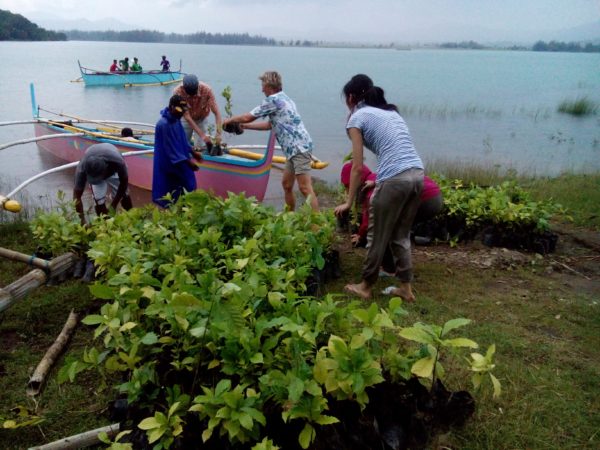PREDA FAIR TRADE VOLUNTEERS PLANTS THOUSANDS OF FRUIT TREES
May 4, 2016 ·

FAIR TRADE SUSTAINS MARGINALIZED FARMERS. Laudato si’
Caring for Creation in Agriculture and Mining – Agriculture – There are few human activities more fundamental than agriculture. Cultivation and domestication are ancient in origin, and now we rely on sustainable agriculture to feed and nourish the world’s people. This is more important than ever in a world of over 7 billion people. The Sustainable Development Goal # 2, for example, calls explicitly for the world community to “end hunger, achieve food security and improved nutrition, and promote sustainable agriculture.” Goal 12 calls for “sustainable consumption and production patterns.” And Goal 15 calls for the sustainable use of terrestrial ecosystems.
Sustainable agriculture represents the deepest level of integral ecology. We are asked to nourish and sustain the earth, so that it can in turn nourish and sustain us. If we despoil the earth, we end up hurting our fellow human beings, especially the poor. The challenges are enormous. In today’s world, about a billion people go hungry and another billion lack vital micronutrients – while 30-40 percent of all food is wasted. To feed the more than 7 billion people alive today – which will rise to 9 billion by mid-century—we need to make sure that agriculture is productive and sustainable.
If we fail to make investments in sustainable agriculture, we are not performing our sacred duty to the poor and to future generations. As Pope Francis put it, “Let us not only keep the poor of the future in mind, but also today’s poor, whose life on this earth is brief and who cannot keep on waiting” (§162).
But we face a double-edged sword. Thanks to the green revolution and the use of fertilizers, crop yields have risen from the range of one half to one ton per hectare to about 3 to 5 tons per hectare. And one reason why sub-Saharan Africa lags behind is deficient soil nutrients – crops yield only between one and one and a half tons per hectare. But excessive use of fertilizers also leads to grave ecological damage. These chemicals can poison the soil and hurt biodiversity. Agriculture is a major emitter of greenhouse gases. Agriculture often adds to the depletion of freshwater resources. And agriculture is often the main rationale for deforestation.
This can become a vicious cycle. Just as agriculture can harm the environment, environmental change can in turn hurt agriculture. For example, as the earth warms due to climate change, the first casualty will be crop productivity, especially in arid regions like the Sahel and the Horn of Africa.[7] And as Pope Francis notes, “greater scarcity of water will lead to an increase in the cost of food” (§31).
Sustainable agriculture is therefore one of humanity’s most important problems, and also one of the toughest. Solving it means improving the ability to grow food by being more productive in poorer regions, while at the same time respecting the rhythms of nature and not despoiling creation. But the solution cannot be purely technocratic. It cannot embody the “technocratic paradigm” that Pope Francis warns us about. It also requires solidarity between the richer and poorer countries, and it requires more sober lifestyles, and far less food waste among the affluent—and more attentiveness to the impact of their actions on the planet and the poor. As Pope Francis noted, “whenever food is thrown out it is as if it were stolen from the table of the poor” (§50).
For Pope Francis, the solution includes respecting, and investing in, small-scale agriculture—in systems that can end hunger, support dignity, and protect the environment. I will quote him on this: “There is a great variety of small-scale food production systems which feed the greater part of the world’s peoples, using a modest amount of land and producing less waste, be it in small agricultural parcels, in orchards and gardens, hunting and wild harvesting or local fishing. Economies of scale, especially in the agricultural sector, end up forcing smallholders to sell their land or to abandon their traditional crops.
Their attempts to move to other, more diversified, means of production prove fruitless because of the difficulty of linkage with regional and global markets, or because the infrastructure for sales and transport is geared to larger businesses. Civil authorities have the right and duty to adopt clear and firm measures in support of small producers and differentiated production” (§129).
That means that public authorities with the common good in mind must direct the legitimate tools of business, such as capital investment and responsible governance, to create the conditions for sustainable agriculture. The purpose: not so that a few can make colossal profits, but that all may live in dignity. “Agriculture in poorer regions can be improved through investment in rural infrastructures, a better organization of local or national markets, systems of irrigation, and the development of techniques of sustainable agriculture” (§180).






